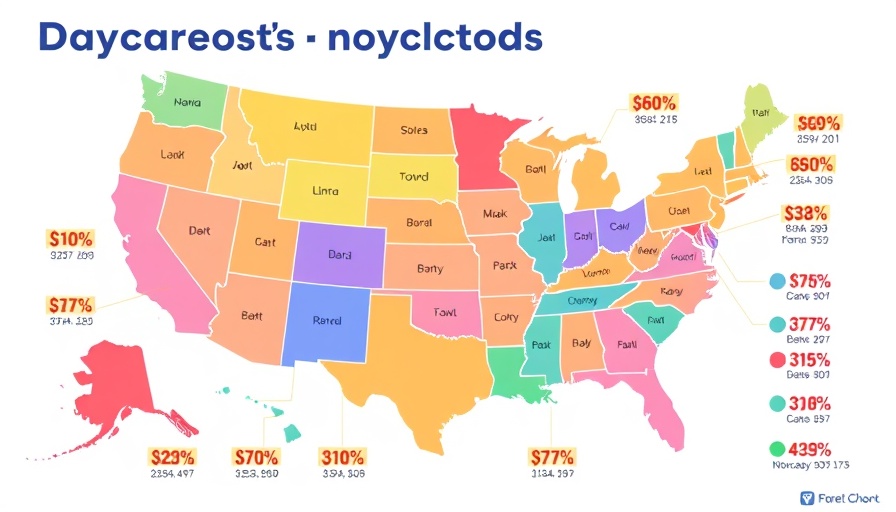
Unpacking Daycare Costs: A Financial Burden for Families
In recent years, the rising costs of daycare have become a significant topic of discussion for families across the United States. With average annual daycare expenses ranging from $24,000 to $147,000, it's clear that the financial burden can be tough. This range means that families in different states are feeling the weight of these costs differently, impacting where they choose to live and how they manage their finances.
Understanding the Daycare Landscape Across America
A recent analysis highlighted that in certain areas, like Massachusetts, the average daycare cost can soar to around $40,000 a year, significantly influencing a family's budget. For many, this isn't just a line item on a balance sheet; it can mean the difference between one parent working and choosing to stay home. In contrast, states like Alabama and Mississippi offer daycare at much lower rates, averaging around $24,000. This discrepancy shows how location can drastically change the financial outlook for parents.
Historical Context: Why Are Daycare Costs So High?
The costs associated with daycare aren't just a matter of rates being set arbitrarily. Instead, they reflect broader economic conditions, regulatory requirements, and the growing demand for quality childcare. Over the past few decades, childcare expenses have outpaced inflation, largely driven by increased demand for licensed providers and higher standards for educational quality in early childhood environments.
The Financial Impact of Daycare on Young Families
For families, these rising costs mean they need to make tough financial decisions. Take the Johnson family from Pennsylvania, for example. With two children in daycare, their household expenses have skyrocketed, leading them to adjust their budgets significantly. They often discuss the potential sacrifice of one parent's career advancement in favor of the other staying home or switching to part-time work. These are powerful choices that affect not only family finances but also career goals and aspirations.
Emotional and Human Interest Angles: Stories from Real Families
Stories abound of parents grappling with the tough decision between career and childcare. For instance, Sarah, a mother of three from Ohio, recounted how her daycare bill nearly matched her salary. Each month, she wonders if working is worth it. This is a sentiment echoed by many: that the cost of daycare often outweighs the benefits of working full-time, leading to feelings of frustration, guilt, and even resentment.
Looking Ahead: Future Insights on Daycare Costs
As we look to the future, the challenge of affording daycare isn't likely to diminish anytime soon. Economic experts predict that as more families seek quality childcare, prices will continue to rise unless significant reforms are made at the governmental level. This includes enhanced subsidies and resources for families needing support. Engaging in discussions about policy reform can be a powerful step towards making daycare more affordable for everyone.
Decisions You Can Make With This Information
Understanding the cost of daycare can empower families to make better financial decisions. You might consider exploring flexible work options that allow for reduced hours, finding local co-ops for childcare, or assessing whether a family member might be willing to assist. These small shifts can help alleviate some financial pressure and give families more control over their childcare situation.
Actionable Insights to Consider for Budgeting
Creating a realistic budget that incorporates childcare costs as a primary expense is crucial for any family. Start by documenting income and fixed costs, and allocate specific funds for daycare. It might also be useful to research various childcare options, as many organizations offer tiered pricing or sliding scale fees based on income.
Find Community Support and Resources
Seeking out local community resources can also help. Many areas have non-profit organizations that provide assistance or scholarship programs for daycare costs. Connecting with other parents can uncover support networks for sharing childcare duties or negotiating group discounts with local centers as well.
Conclusion: The Importance of Awareness and Advocacy
The rising costs of daycare have profound implications for family finances. By understanding these dynamics and taking proactive steps, families can navigate these expenses more effectively. As you consider your own financial planning, think about how you can advocate for more affordable daycare solutions in your community. Whether through local policy, shared resources, or communal support, every effort counts in working towards a future where quality childcare is accessible to all families.
Call to Action: Explore how local resources and community networks can alleviate your daycare costs today. Connect with fellow parents and advocacy groups to drive change in your area!
 Add Row
Add Row  Add
Add 




Write A Comment